It time to prep yourself to jump into the water, and get your hand dirty in the mud pool while rowing your own tiny, paper boats over the little streams of water flowing beside .monsoon is a blissful season with onset of monsoon the environment is subject to fatalities like flood and in such a case, it cause severe loss to the mankind, flora and the fauna.
As we take preventive measures and extra care for ourselves during the rainy season, the same is needed for the animals especially the livestock who roam around and live in open fields, leaving them exposed to life–threatening diseases.
Animals suffer due to change of extremely sunny dusty day environment stress due to changing weather conditions from hot summer to rainy cool weather. Cold weather, impure water, and overwork during the rainy season can make a difference in livestock health and also the productivity and efficiency Therefore, preservation of livestock during rainy season is essential.
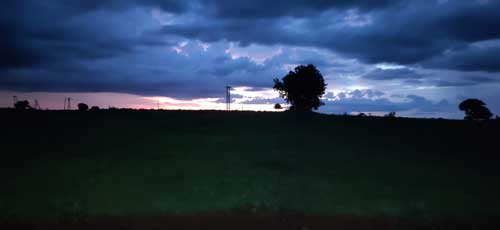
SOME OF IMPORTANT MANAGEMENT SHOULD BE DONE FOR THE ANIMALS DURING RAINY SEASON
- Leaking shed roofs: If there is any leakage in the animal shelter then it will be affect the comfort of your animals. If shed is not clean enough means it will leads to the increasing the ammonia level in the shed it will cause the eye infection and respiratory disorders in animals. Coccidiosis can also take upper hand in water logged shelter. For goats, livestock farmer needs to keep their hooves away from water to avoid hoof rotting disease.
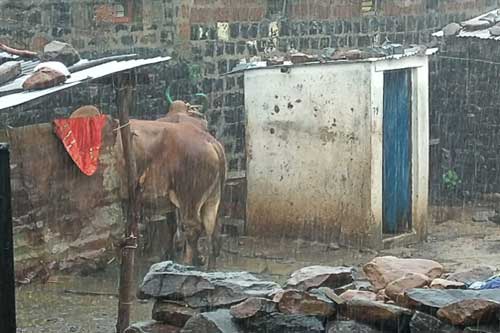
- The moisture present in the ground produce lots of bacteria that can cause disease. So we have to clean the ground regularly. If more moisture present in the ground it will produce the worm infestation.
- Feeding: of live stocks should be taken at most important in rainy season. Grass that grow in the rainy season have lots of water as well as fiber . The water fills up the stomach and therefore, it is virtually of no use .This causes animals to pass watery dung in the wet season. So we have to feed the feed the quantity of green fodder and dry fodder to animals. The cow specifically require feeds that are full of essential nutrients as they consume more energy to adjust to the climate conditions and maintain a balanced positive energy .
*Increase the feed amount during this period need more food and energy to produce heat to survive in the cold weather.
- Tick problem : Tick infestation is the more rapidly spread in the rainy season. If ticks are more in the animals shelter which cause the haemoprotozoan diseases in the animals like trypanosomosis , theileriosis , babesiosis, anaplasmosis and east coast fever which spread by the ticks and flies. So farmer must take the animals to the nearest veterinary hospital.
- Udder Diseases: Diseases of udder also becomes common in the rainy season. Unhygienic management or dirty animal shelter which is more prone to cause the mastitis in the animals. By this dirty shed fibrosis of udder will be appear and there will be flakes in the milk .
- Farmer should see the feed is free from the moulds. If leakage in the animal shelter produces the moulds by feeding the mouldy feed to animal will suffer from cancer.
- Bedding: Prepare dry bedding. It is very difficult to availability of dry fodder is very less in the rainy season .You can option for dry straw or animal mattresses .
- Drinking water: The rainy season doesn’t imply sufficiency of drinking water cow must be adequately fed with clean and potable water to avert a reduction in consumption of feed by the cow. However you must ensure that water you supply is not to cold or at a freezing temperature.
- Taking care of milking animals in rainy season:
- After the onset of the rainy season, cattle and buffaloes should be deworm against the nematodes, trematodes and cestodes . Buffaloes should be vaccinated against hemorrhagic septicemia (HS) in rainy season. For cattle and calves we should vaccinate against the black quarter (BQ).
- Do not leave grazing land during rainy season. Degree of milk is a problem due to the high water content in the young grass. Provide clean water for drinking. Provide green fodder along with dry fodder to animals to gives high milk yield.
- Starting of rainy season farmer doesn’t allow animals to drink red water which is stagnant in the field because that will cause the severe cold, diarrhea, black quarter (BQ) and many other disease will spread through this water.
- Raising of bullock during the rainy season :- After the onset of the rainy season the bullock should be deworm with broad spectrum anti-helminthics and also the vaccinate against the black quarter disease.
- Do not work in the yard when it rains and do not leave the bullocks outside for grazing at the time of raining.
- More than 1 kg of chunni mix should not be given per day during sowing. Giving a high chunni mix can cause stomach problems like bloat will appear in bullock.
- Feeding 250 to 300 grams of jaggery at the day of sowing should be given to bullock this can reduce fatigue during overworked sowing.
- During the rainy season, the problem of yokegall and limping is more frequent in bullock. At any cost farmer should not neglect this he must visit the nearby veterinary hospital for better treatment and provide proper rest to the animals.
Care of calves in the rainy season
The calves should not leave outside during the rainy days calves should be provide proper heat ,and also feed the little bit more amount of milk to the calves to generate the heat. Above 3 months of age should be given the dewormer. The calves over six months should be vaccinated against the BQ and HS disease .
Rearing of sheep and goats in the rainy season
- After the onset of the rainy season, sheep and goats should be fed with dewormer, and after one week then vaccinated against Peste des petits Ruminants (PPR) disease. after 1 month we have to vaccinate against Enterotoxemia (ET) disease.
- During rainy season we should not shearing the wool of the sheep. Sheep and goats should not be grazed during rainy season. Do not graze on herbicide sprayed fields.During the rainy season sheep and goats are having trouble with the hoof, so it should not be carried in mud. Getting rid of lime twice a week in the barn can reduce the problem of hoof ulcers. Sheep tracks in flowing water need not be an adventure. In the case of a dense black cloud, shepherds must move with their animals to safe areas.
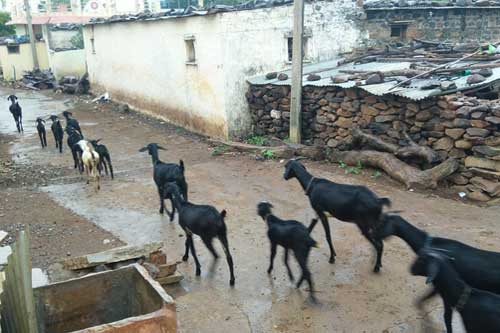
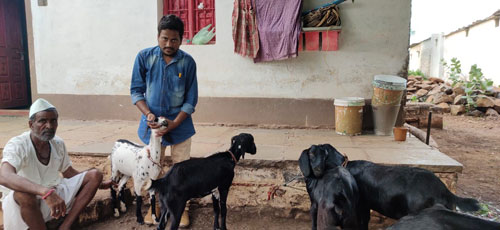
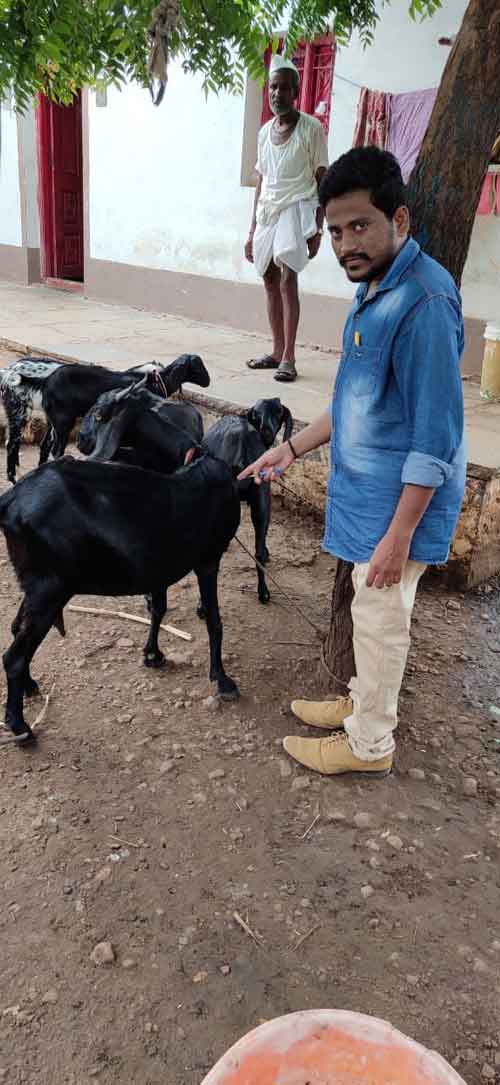
Preventive measures required during rainy season
- Live stocks shed should be leak-proof and clean.
- live stock farmer must maintain the dry fodder before mansoon starts.
- Deworming must be done beginning of the rainy season because worm multiply at a greater rate during this period .
- farmer must spray ectoparasites on the body of animals .
- Feed must be stored in the dry area.
References
- Feed and principles of Animal nutrition – by Banerjee GC 1988
- Sheep production and management –by Ross CV1989
- Principles of Anaimal Nutrition and Feed Technology- by Reddy DV2003
- Care and Management of dairy Cattle and Buffaloes – by Dutta G 3rd Ed. ICAR
- ICAR Handbook of Animal Husbandry -2002 3rd Ed.
- Livestocks Production and Management . – by Shastry NSR &Thomas CK 2006.



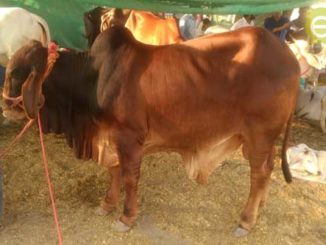
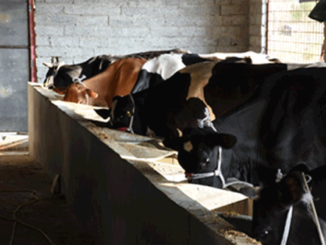

Super article Rahul
Good information DR.
Nice article my son Dr Rahul keep writing new article like this
Super Dr Rahul pawar
Super Dr
Very informative Article…